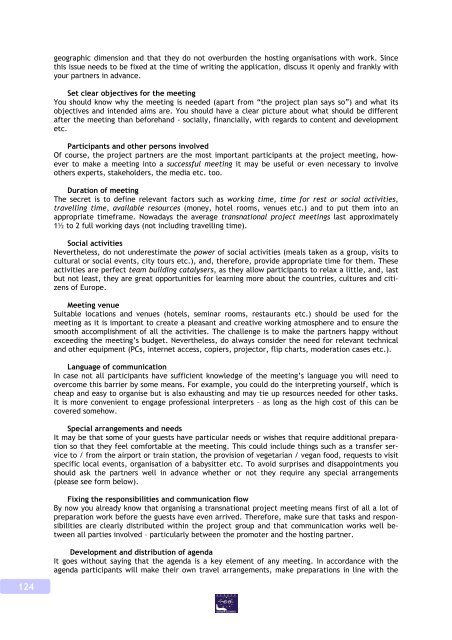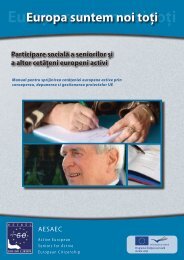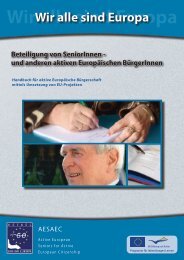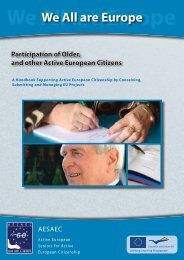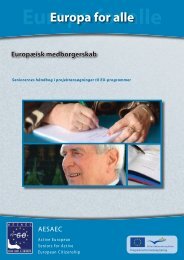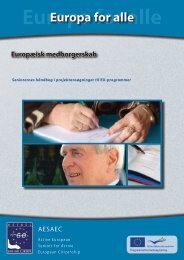We All are Europe - AESAEC
We All are Europe - AESAEC
We All are Europe - AESAEC
Create successful ePaper yourself
Turn your PDF publications into a flip-book with our unique Google optimized e-Paper software.
geographic dimension and that they do not overburden the hosting organisations with work. Since<br />
this issue needs to be fixed at the time of writing the application, discuss it openly and frankly with<br />
your partners in advance.<br />
Set clear objectives for the meeting<br />
You should know why the meeting is needed (apart from “the project plan says so”) and what its<br />
objectives and intended aims <strong>are</strong>. You should have a clear picture about what should be different<br />
after the meeting than beforehand - socially, financially, with regards to content and development<br />
etc.<br />
Participants and other persons involved<br />
Of course, the project partners <strong>are</strong> the most important participants at the project meeting, however<br />
to make a meeting into a successful meeting it may be useful or even necessary to involve<br />
others experts, stakeholders, the media etc. too.<br />
Duration of meeting<br />
The secret is to define relevant factors such as working time, time for rest or social activities,<br />
travelling time, available resources (money, hotel rooms, venues etc.) and to put them into an<br />
appropriate timeframe. Nowadays the average transnational project meetings last approximately<br />
1½ to 2 full working days (not including travelling time).<br />
Social activities<br />
Nevertheless, do not underestimate the power of social activities (meals taken as a group, visits to<br />
cultural or social events, city tours etc.), and, therefore, provide appropriate time for them. These<br />
activities <strong>are</strong> perfect team building catalysers, as they allow participants to relax a little, and, last<br />
but not least, they <strong>are</strong> great opportunities for learning more about the countries, cultures and citizens<br />
of <strong>Europe</strong>.<br />
Meeting venue<br />
Suitable locations and venues (hotels, seminar rooms, restaurants etc.) should be used for the<br />
meeting as it is important to create a pleasant and creative working atmosphere and to ensure the<br />
smooth accomplishment of all the activities. The challenge is to make the partners happy without<br />
exceeding the meeting’s budget. Nevertheless, do always consider the need for relevant technical<br />
and other equipment (PCs, internet access, copiers, projector, flip charts, moderation cases etc.).<br />
Language of communication<br />
In case not all participants have sufficient knowledge of the meeting’s language you will need to<br />
overcome this barrier by some means. For example, you could do the interpreting yourself, which is<br />
cheap and easy to organise but is also exhausting and may tie up resources needed for other tasks.<br />
It is more convenient to engage professional interpreters – as long as the high cost of this can be<br />
covered somehow.<br />
Special arrangements and needs<br />
It may be that some of your guests have particular needs or wishes that require additional preparation<br />
so that they feel comfortable at the meeting. This could include things such as a transfer service<br />
to / from the airport or train station, the provision of vegetarian / vegan food, requests to visit<br />
specific local events, organisation of a babysitter etc. To avoid surprises and disappointments you<br />
should ask the partners well in advance whether or not they require any special arrangements<br />
(please see form below).<br />
Fixing the responsibilities and communication flow<br />
By now you already know that organising a transnational project meeting means first of all a lot of<br />
preparation work before the guests have even arrived. Therefore, make sure that tasks and responsibilities<br />
<strong>are</strong> clearly distributed within the project group and that communication works well between<br />
all parties involved – particularly between the promoter and the hosting partner.<br />
Development and distribution of agenda<br />
It goes without saying that the agenda is a key element of any meeting. In accordance with the<br />
agenda participants will make their own travel arrangements, make preparations in line with the<br />
124


